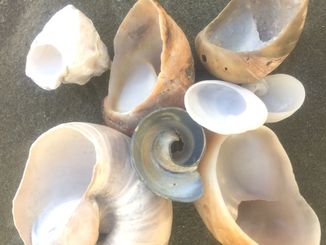
This is a story of an ear.
This winter, my right ear, as in a slow-motion film, closed. I remember exactly when it happened. My ear canal, once an open, receptive place, folded upon itself. Sounds around me magnified, but my own voice stayed trapped in a tunnel.
All things I love about words and the human voice--conversations, singing, writing--closed for me too. My jaw felt frozen, locked. It was as if my ear didn’t want to hear what was happening around me, so it stopped hearing. Stopped being open and vulnerable. Words no longer accessible.
I was forced to be quiet. To be still.
W.A. Mathieu, composer and teacher, writes in The Listening Book Discovering Your Inner Music: "the ear is a haven...how delicate is the egg of an ear."
The ear is a little capsule to protect and cherish.
Aa a writer and as a human being, I know the importance of listening. In her memoir about writing, One Writer’s Beginnings, Eudora Welty’s first section is simply entitled: Listening. Welty writes of her “physical awareness of the word.” As a child being read to, she heard an inner voice, “the voice of the poem or story itself.” She writes, “The cadence, whatever it is that asks you to believe, the feeling that resides in the printed word, reaches me through the reader-voice…The sound of what falls on the page begins the process of testing it for truth.”
It is important to take care with words. To listen to of an inner voice.
I have a vision inside my head of my ear, the small hairs almost in a super electrical current, trembling, waiting.
How can a writer be open and closed at the same time? How can I let what may be useful, but hurtful, in or go out in the world? At a recent workshop in journal keeping, we discussed the delicate balance of having true writing, but protecting ourselves and others. It is a delicate balance. But I have choices. When I write, I may consciously make them. I can discriminate, act, pay attention. I can have tenderness for myself. Protect myself.
I can let my ear gradually open.
This winter, my right ear, as in a slow-motion film, closed. I remember exactly when it happened. My ear canal, once an open, receptive place, folded upon itself. Sounds around me magnified, but my own voice stayed trapped in a tunnel.
All things I love about words and the human voice--conversations, singing, writing--closed for me too. My jaw felt frozen, locked. It was as if my ear didn’t want to hear what was happening around me, so it stopped hearing. Stopped being open and vulnerable. Words no longer accessible.
I was forced to be quiet. To be still.
W.A. Mathieu, composer and teacher, writes in The Listening Book Discovering Your Inner Music: "the ear is a haven...how delicate is the egg of an ear."
The ear is a little capsule to protect and cherish.
Aa a writer and as a human being, I know the importance of listening. In her memoir about writing, One Writer’s Beginnings, Eudora Welty’s first section is simply entitled: Listening. Welty writes of her “physical awareness of the word.” As a child being read to, she heard an inner voice, “the voice of the poem or story itself.” She writes, “The cadence, whatever it is that asks you to believe, the feeling that resides in the printed word, reaches me through the reader-voice…The sound of what falls on the page begins the process of testing it for truth.”
It is important to take care with words. To listen to of an inner voice.
I have a vision inside my head of my ear, the small hairs almost in a super electrical current, trembling, waiting.
How can a writer be open and closed at the same time? How can I let what may be useful, but hurtful, in or go out in the world? At a recent workshop in journal keeping, we discussed the delicate balance of having true writing, but protecting ourselves and others. It is a delicate balance. But I have choices. When I write, I may consciously make them. I can discriminate, act, pay attention. I can have tenderness for myself. Protect myself.
I can let my ear gradually open.
 RSS Feed
RSS Feed